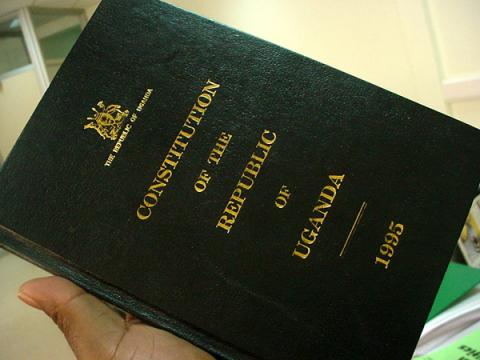
By Michael Mubangizi
Is it an issue of lack of money or the state fearing civically alert citizenry?
The question remains why, why is the Ugandan constitution not translated into local languages and its provisions popularized as envisioned by its framers?
Is it lack of resources? or just a deliberate attempt by the government to keep people in the dark about their entitlements and what they should expect from their government.
Article 4 (a) of the Ugandan constitution enjoins the state to promote public awareness of this Constitution by translating it into Ugandan languages and disseminating it as widely as possible.
On the other hand, article 4 (b) provides for the teaching of the Constitution in all educational institutions and armed forces training institutions and regularly transmitting and publishing programmes through the media generally.
Besides these provision, the constitution creates the Uganda Human Rights Commission whose work includes with playing a key role in the popularization of key constitutional provisions.
Article 52 (1) of the 1995 Constitution lays down the functions of the Uganda Human Rights Commission as including;
(e) to create and sustain within society the awareness of the provisions of this Constitution as the fundamental law of the people of Uganda;
(f) to educate and encourage the public to defend this Constitution at all times against all forms of abuse and violation;
(g) to formulate, implement and oversee programmes intended to inculcate in the citizens of Uganda awareness of their civic responsibilities and an appreciation of their rights and obligations as free people.
These fundamental constitutional establishments demonstrate a commitment of government of Uganda to popularize the key provisions of the constitution to the populace as a means of creating a civically active citizenry fully aware of their entitlements and with ability to demand for these entitlements.
However most of these provisions appear to largely remain on paper because of a poor implementation culture ably demonstrated by the perennial lack of allocation of money to support the translations of the constitution and sensitizations and even support to statutory bodies meant to champion this process.
For instance the Uganda Human Rights Commission had consistently complained about inadequate funding as one of the hindrances to their work. It’s 2012 Annual report captures it well when it concludes,
“The UHRC faced persistent challenges in the provision of human rights education which included inadequate funding for civic education, non functional district human rights committees due to lack of funding from the Ministry of Local Government and non-prioritisation of human rights issues at the districts.”
As recommended in its previous annual reports, the Uganda
Human Rights Commission again asked government to, “designate a programme for continuous civic education to support the Uganda Human Rights Commission fulfill its constitutional mandate in the area of human rights education.”
The report also implores the Uganda Law Reform Commission to “translate the Constitution into more local languages in order to ensure that more people are aware of the provisions of the Constitution.”
The resultant effect of the absence of these translations is a citizenry totally ignorant of their entitlements as well as their civic roles and responsibilities, an issue that affects their capacity to demand for what rightfully belongs to them and also holds governments and their leaders accountable to their promises and obligations to its people.
This is because constitutions globally and in Uganda in particular carry entitlements including rights to be enjoyed by the citizenry. In the case of Uganda, these are mainly contained in article 4 of the constitution on the protection and promotion of the fundamental rights and freedoms.
Like it is written in the Bible in Romans 10:14,
“How, then, can they call on the one they have not believed in? And how can they believe in the one of whom they have not heard? And how can they hear without someone preaching to them?”
This can be said of the key provisions of the constitution, “How can they hear without someone preaching to them?” the same can be asked of the constitution, how can they know and enforce and respect provisions of the constitution unless someone tells them?
With an illiterate population and difficulties in expression in English, translating the constitution in local languages becomes very helpful to help people comprehend key provisions of the constitution.
Yet not all is lost. The Uganda law Reform Commission lists on its website as part of its priorities for the FY 2014/2015 the printing of the translated versions of the constitution into Runyoro/ Rutoro as well as translation of the constitution into Runyankore/Rukiga.
According to Agnes Kisamba, a senior legal officer at the Uganda Law Reform Commission says so far the draft constitution in Langi, Acholi and Luganda languages are complete.
Similarly, the Uganda Law Reform Commission Strategic Plan 2011- 2016 states that abridged versions of the constitution were translated and published into Langi and Acholi
But why is this so 19 years after the promulgation of the constitution? But why should we be talking of starting to work on realizing these noble obligations 19 years down the road? Shouldn’t the focus now actually be on giving an account of what has been achieved instead of what it intends to do? Or shouldn’t we by now have had the constitution translated in all the major dialects in Uganda?
Speaking into this issue, people like outspoken Kabale based cleric Fr. Gaetano Batayenda said in an earlier interview with Sunday Monitor that this a deliberate ploy by leaders to keep people they lead ignorant of their rights,
“For the dictators of Africa, their survival mainly is the illiteracy and poverty of the people they lead and this was face to face,” he says adding,
“Imagine being illiterate and poor, what can you do? .... Government can’t tell us that they don’t have money when there is all this money being stolen and embezzled, it is intentional.”
Human Rights Defender Vincent Nuwagaba shares similar sentiments with Fr. Batayenda saying it’s government’s deliberate effort to keep its citizenry backward,
“President Museveni has always touted the teaching of the so-called science subjects because they are marketable. Nonetheless, the concentration on sciences at the expense of humanities and social sciences has created docile citizens who cannot hold their leaders to account. Today, civics is no longer taught in primary schools, political education is less emphasised in secondary schools and government institutions such as the Uganda Human Rights Commission which should ordinarily carry out civic education seem to be less enthusiastic about the translation of our Constitution.”
Nuwagaba wants political leaders to prioritise the translation of the Constitution to local languages and distribution of the same to copies of the Constitution to all Local Council leaders free of charge,
“Our people must be empowered through knowing that the Constitution provides parameters within which our leaders must operate and that if leaders go beyond those parameters, there are sanctions in the Constitution. If our patriotism drive will entail teaching citizens their God given and constitutional rights, I am ready to render my services at no cost. After all, I attained university education on taxpayers’ money.”
Well Mr. Nuwagaba, and Fr. Batayenda express wishes that the framers of the 1995 constitution had, but as to whether these will soon be translated into reality, only time will tell. It is also clear that the implementation of these provisions requires more than wishes but action.
The author is an MA student at the Department of Journalism & Communication
- Log in to post comments




